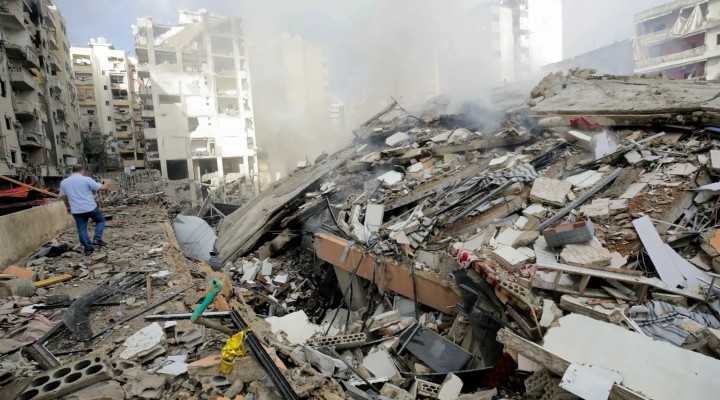From dejection to hope to victory

Hezbollah will recover, freed from past constraints, sooner than Netanyahu imagines
The mood of dejection prevailing among much of the Arab public after the assassination of Hezbollah leader Hassan Nasrallah and the massive escalation of the Israeli bombing of Lebanon is not surprising.
Nor is it a surprise that the Israeli and Western media, echoed by some of the Arab media, should be trying to exploit the situation to try to create a sense of despair leading to surrender. Benjamin Netanyahu is an expert in this field with his mobilisation of political lobbies and multi-billion-dollar expenditure on a ‘hasbara’ propaganda machine that runs thousands of journalists and Internet trolls around the world — including, regrettably, some Arab ones with the encouragement of their regimes.
There is no question that Israel’s intelligence penetrations of Hezbollah with US, Western, and Arab support dealt it a painful, harsh, and even humiliating and shocking blow, as did its intensive bombing of towns and villages in the resistance’s heartlands. But this shock and carefully calculated destruction of morale will not last. It will dissipate in a matter of days, and once it finally lifts we will be facing an entirely new reality, with the losses and despair afflicting the side of Israel and its colonists more.
I personally lived through the 1967 defeat, when I was a pupil at Bir as-Sabe’ Secondary School in Rafah refugee camp in the Gaza Strip. I saw the shock felt by people there after the defeat and collapse of the Egyptian army in which they had vested such high hopes. But the gloom did not persist for long. Resistance was started within days of the occupation. Daring guerilla raids were launched against Israeli forces by fighters equipped with rickety old guns but formidable resolve. These and similar operations in the West Bank restored confidence to the population and indeed the entire Arab world. The joint victory in the Battle of Karameh the following year by Jordanian forces led by the late great Mashhour Haditha al-Hijazi and the fedayeen of the Palestinian resistance groups against the Israeli army served to erase any sense of despair. Hope was renewed of ultimate victory and liberation and the defeat of the occupation forces.
The Islamic resistance in Lebanon has persisted with its targeting of the Israeli interior over the past three days. Its arsenals remain intact and well stocked with military equipment and short- and long-range missiles stored deep within the mountains of southern Lebanon. Despite the calamity, those missiles have reached Haifa, Nahariya, and Safad, and these attacks are likely to be a mere foretaste of what is to come at the hands of its fighters, the sons and students of the martyred leader.
Resistance is a deep-rooted impulse that does not die with the deaths of its leaders. Israel’s wanton havoc-wreaking has only strengthened it and broadened its appeal. Just as Nasrallah took up the banner after Israel’s murder of his predecessor Abbas Mousawi, so will his successor follow his lead, arguably more forcefully and effectively. Hezbollah’s new secretary-general — most probably Hachem Safieddine — will no longer be bound by many of the constraints, alliances, equations, and rules of engagement that limited Nasrallah’s scope for action.
Netanyahu is currently puffing up his feathers and strutting around like a peacock, considering himself a national hero. But his rejoicing will not last long. The Arab and Islamic titan will most definitely emerge from the shock and get over it and its consequences sooner than he imagined. It is only a matter of time, which heals everything, and this is not the first major setback we have experienced.
Without getting ahead of events, from what I know about Hezbollah’s new leadership it is likely to be more hardline in dealing with the occupation, avenging its martyrs, strengthening its ranks, and closing all security breaches. I for one will not be surprised if, once it puts the party’s internal affairs in order and rebuilds its military command structure, it takes strategic decisions to strike out at all Israeli cities and infrastructure, including airports, ports, and power and water facilities. It has nothing left to lose from that, and will not have started the escalation.
It is Netanyahu who expanded the circle of war and extended his massacres and annihilation from the Gaza Strip and West Bank to Lebanon. He must be made to pay a heavy price for this reckless gamble along with his US backers, whose interests and bases throughout the region will come under threat.
Israel’s bombing of the city of Hodeida and its airport will also not go unanswered. It is no exaggeration to say that attacking Yemen’s infrastructure was a major strategic blunder by the occupier-state. It turns Yemen into more than just a confrontational state and will make it wage war with all its might, not only in solidarity with Gaza and to press for an end to the war on its people as has been the case so far, but to avenge its own martyrs. Netanyahu and his generals can expect more hypersonic missiles and precision drones from Yemen, along with thousands of Yemeni fighters who will flock to Lebanon to join the escalating war, not only to repel the Israeli army and defend the Lebanese resistance, but to liberate Galilee alongside fellow volunteers from Iraq and Syria, and maybe Jordan, Algeria, Iran, and other Arab and Islamic countries — as was the case when the Palestinian resistance was based in Lebanon, if not on a larger scale.
The saying that good may come from the belly of evil bears repeating, and it is the title of the coming stage and the days ahead.
 TheAltWorld
TheAltWorld 
0 thoughts on “From dejection to hope to victory”